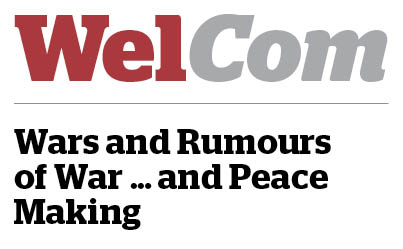September 2016
Features
This is the second part of a three-section article in which Bishop Peter Cullinane explores the meaning of gradualness in working for peace.
It is well known, of course, that religions have played a part in many violent conflicts. This is what happens when religion is turned into ideology, with its impulse to impose and dominate. Faith, by contrast, respects the dignity and freedom of persons, human and civil rights, and the primacy of conscience. Christians, Muslims and Jews are among those who have taken a long time to fully realise this. They did not always see it was incompatible with the nature of faith and the dignity of persons to impose the truth they wanted to share.
Some still don’t. Some Christians, especially of a fundamentalist disposition, still display an intolerance that falls short of full respect for human dignity and rightful freedom. (Fundamentalists have yet to learn that what sacred texts actually teach is not necessarily the same as what they merely presuppose.) Echoes of ideologised religion also surfaced at the Second Vatican Council, but now live on only in groups that didn’t accept the Council’s teaching on ecumenism, inter-faith relations, and religious liberty.
Islam’s experience is ambiguous: the Ottoman Empire was Islamist, yet even though sharia was the law of the land, the Ottoman system did not impose Islamic culture on the empire’s Jewish, Christian or other minority communities. (Later clashes were reprisals against nationalist and separatist movements during the break-up of the empire.) There, and in other parts of the world, Jews, Christians and Muslims have lived harmoniously together, even under Islamic rule. But freedom of religion and of conscience vanishes wherever Islam has tried, or still tries, to impose its culture. Human and civil rights have emerged in humankind’s consciousness where the Enlightenment has been experienced and its values critically assimilated. Much of the Islamic world has not had that experience – or is in shock at how the Western world has abused freedom.
People responsible for political judgements may wonder whether a state can claim to be acting in self-defence when it has blatantly provoked the frustration and reprisals of the people it oppresses. Whatever about any political judgement, there is also a religious dimension to the modern State of Israel’s oppression of the Palestinian people: at the core of Hebrew faith was the discovery of God’s great and unmerited mercy, and the resulting need to show mercy – in ways that never occurred to ancient Israel’s pagan neighbours. Today, whatever about the trappings of faith, it is the core of Hebrew faith that the State of Israel has lost.
Secularism itself is repressive in an inverse way when, acting out of its denial of faith, it moves in the direction of denying religious freedom and freedom of conscience. The impulse to impose and dominate is common to all ideologies, religious and secular.
The Judeo-Christian tradition predicts a time when nations ‘will hammer their swords into ploughshares, their spears into sickles, and not lift sword against other nations nor train for war any more’ (Isaiah 2:4). There are those who would turn such a prophecy into a moral principle for immediate and universal application. They telescope the end-time into the present. But real time is needed for moral growth and human development. In this meantime, peace-makers include those who promote disarmament, ‘truth and reconciliation’, restorative justice, Médecins Sans Frontières [Doctors Without Borders], etc. There is a down-to-earth realism in accepting forgiveness presupposes acknowledgement of the offences that need to be forgiven. ‘Only an honest confrontation with reality can bring real healing. Superficial reconciliation can bring only superficial healing’ (Archbishop Desmond Tutu).
There is realism also in the Catholic Church’s treasury of Catholic Social Teaching – as well as in the commitment of people, of all faiths and none, who work to change the social and economic conditions that spawn injustices, resentments and wars. By the same token, these people are also ‘prophets’, because the deeds of justice, peace and reconciliation are experienced as reminders of what our hearts are made for, and intimations that what we hope for can really happen.
PJ Cullinane, June 2016.
